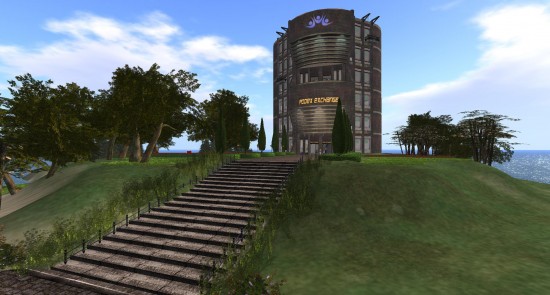UK-based virtual currency exchange Podex has teamed up with Last Vegas-based OpenSim hosting company Zetamex to offer a new currency option for OpenSim grids. Today, grids have three choices for in-world payments: a local currency that they create and manage themselves, the multi-grid, hypergrid-enabled OMC — Open Metaverse Currency — from Austrian currency exchange Virwox, or PayPal.
The total value of OMC transactions has more than tripled last year, but the Podex-Zetamex alternative will offer a couple of advantages, said Zetamex CEO Timothy Rogers.
First, the two vendors are working to make shopping more reliable. Today, if a purchase doesn’t go through, or the content doesn’t survive a hypergrid trip to another grid, buyers have to go to OMC issuer Virwox to reverse the charges. This can be a cumbersome process, and may discourage some users from shopping at all.
“So we are working on a way to make this [new] module behave better than the [Virwox] one that is available,” Rogers told Hypergrid Business.
Second, the Virwox module currently lives on a region’s servers, which have to handle the processing related to verifying the transaction and sending and receiving Web page requests, he said.
“We are going to run all our transactions in the cloud, and behind SSL encryption,” he said. “This is to protect all use cases of the money transactions. And by doing 90 percent of the work on our servers, there is no strain on the OpenSim instances like there was with the Virwox module.”
Finally, the new currency will work with Podex’ debit card service, where users can load and unload virtual money directly to a real-world debit card.
“And the card works in most countries as well, due to it being powered by Visa,” said Rogers.
The new currency doesn’t have a name yet, he said, and will be available in the next couple of months.
Proprietary option
A multi-grid currency offers advantages to both grids and customers. Hypergrid-enabled grids and merchants get access to a wider pool of customers than just the residents of their own grid. And if a grid — either closed or hypergrid-enabled — shuts down, customers don’t lose their virtual currency and can continue to spend it on other grids.
However, some grids, especially closed commercial grids, may prefer to have their own currency as a matter of prestige. In addition, a proprietary currency on a closed grid can be run without needing a second confirmation step — customer can simply click and buy, as they currently do in Second Life.
For these grids, Zetamex and Podex will offer the new currency as a private-label service.
Zetamex will handle the technology and installation, and Podex will take care of the trading and legal issues surrounding being an issuer of a virtual currency.
“This one should be ready for beta signups in the next week or so,” said Rogers.

The invitation-only Zandramas grid is already using Podex to run their virtual currency, Z$. The grid previously used the OMC.
The Virwox module has been having “more than its share of hiccups” ever since the grid upgraded to the latest version of OpenSim, explained Rogers, whose company provides the back-end hosting for the grid.
“The system is set to go live very soon, however there are some slight delays expected as they want to give all their residents time to get migrated over to the new system,” Rogers said in a post about the changeover.
Podex is providing Second Life-style payment infrastructure for the grid, including transaction histories for individual accounts, Podex CEO Jacek Shuftan told Hypergrid Business.
“Â It can be good solution for other grids, where owners would like to have currency but do not want, or can not, cope with financial regulations and the risk connected
with money flow,” he added.
Podex began to expand their outreach to OpenSim grids in the spring of 2013, after Linden Lab temporary cut off all third-party currency exchanges — then allowed them to operate again but only on the condition that they only resell Linden dollars and do not buy them back from users.
It began trading Avination C$ in July of 2012, and added Virtual Highway’s V$ in May of last year.

Then, last Tuesday, Podex began trading the most popular OpenSim currency — InWorldz’ Iz$.
InWorldz residents can use the exchange to both buy and sell Iz$ using US dollars, Euros, British pounds, or Bitcoins, sa well as currencies from other supported grids — Second Life L$, Virtual Highway V$ and Avination C$. Customers can also get access to the Podex Visa Card, which can be used both in real-world ATMs and point of sale locations as well as at in-world terminals. In addition, Podex’s InWorldz customers can also earn commissions by putting an ad on their websites or blogs or installing a Podex ATM on their InWorldz region.
The deal between Podex and InWorldz has bee in the works for a while, InWorldz LLC partner Beth Reischl — also known as Elenia Llewellyn in-world — said in a discussion on the InWorldz forum page of the announcement.
“Podex has met with us and has voluntarily decided to follow FinCEN guidelines in regards to transactions for cashouts, which is a big deal for us,” she said, referring to recent US government guidelines for virtual currency exchanges. “They are also willing to accept all fraud liability that results from their system, and they are very aware of what to look for in transactions to alert to fraud.”
- OSgrid back online after extended maintenance - April 16, 2025
- Analysts predict drop in headset sales this year - March 25, 2025
- OSgrid enters immediate long-term maintenance - March 5, 2025
